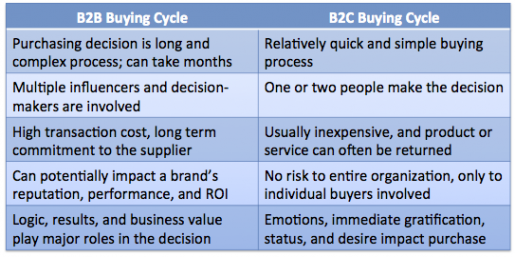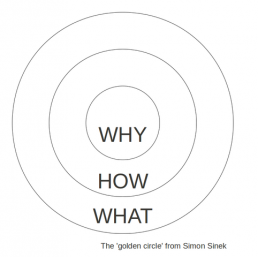
Should B2B marketing appeal more to our emotions?
Table of contents
As B2B marketers, we’ve always been taught that purchasing decisions are based on logic and rational thinking. But what if this isn’t entirely true?
To determine whether emotion should be a part of B2B marketing, we didn’t first consult Google. Instead, the Oktopost team turned to real B2B marketers who target prospects daily.
How did we do it? We used LinkedIn. About a week ago, we posted the question: “Should B2B marketing appeal more to our emotions?” in Marketing Communication, a LinkedIn Group geared towards marcom professionals with over 250,000 members.
Most commenters didn’t warmly welcome the idea of increasing the emotional appeal of B2B marketing. Some even believe that an emotional factor may be viewed as “manipulative” by B2B prospects since it diverts their attention from the facts.
Yet, many admitted that emotions do play at least a minimal role, given that B2B relationships are built on trust and credibility.
B2B vs. B2C: Buying cycles
Let’s take a quick look at the main differences and factors that differentiate the B2B and B2C buying cycles from each other.

B2B Marketing word association
Considering all these differences, it’s not hard to understand what’s keeping B2B marketers from creating more emotional content. After all, they need to prove that their product or service delivers business value, is the right long-term choice for the company, and is worth the high transaction cost.
When there’s so much pressure to deliver the facts, finding a place for emotion is hard—but that’s not to say it doesn’t exist. It does, but as a different set of emotions than the ones we attribute to the B2C realm, such as desire, happiness, sadness, nostalgia, excitement, and spontaneity.
Many LinkedIn commenters strongly argued that emotional appeal matters, but only in building a credible and trustworthy brand. The comments often mentioned Words like trust, reliability, relationship, and stability.
Which emotions are most related to B2B marketing?
Emotion in B2B marketing aims to communicate a company’s values and how they can foster strong personal connections and create trust. In fact, some commenters mentioned that using emotion outside of this objective can actually damage the buying process.
In this sense, B2B decision-makers don’t want to feel emotionally “manipulated” by marketers and prefer to reach their decision based on logic, rational thinking, and business value – especially since it can impact the company at large.
Recommended for further reading
B2B marketers share their thoughts
We read through nearly 50 comments and selected the ones that offered the most insight into the role of emotions in B2B marketing.
“B2B transactions involve numerous departments, influencers, authorizers, and approvers, which makes it difficult to find an emotional appeal that would effectively hit all of the groups involved in a typical purchase path. Some may see An emotional appeal as trying to manipulate them, which could actually hurt you. In general, B2B buyers would rather you provide them with the facts and figures they need to compare competing vendors/products.
-Richard Hatheway, CMO, Scouter Research
“As a B2B Marketer with extensive experience in B2C, I can say that both are emotional – they just appeal to a different set of emotions. If you are pushing something creative – regardless of whether you’re B2B or B2C, it will invoke excitement. However, B2B emotions tend to focus on feeling safe, confident, etc.”
-Nicc Lewis, VP Marketing, Leverate
“In the B2B world, the multi-level aspect, complex process, and lengthy cycle to conversion means that emotional triggers don’t necessarily reach the intended audience or decision maker…Trust, integrity, and reliability create a more lasting impression in a B2B setup. Established companies seem to prefer the long-standing approach of building actual relationships.
-Rochelle Gampon, Global Marketing Operations Manager, INSEAD
“B2B marketing emotional appeals can be a two-edged sword. Many buyers see this as manipulation and resent it. Therefore, if you decide to engage in an emotional appeal – it had better be good. Overall, the “formula” is about fostering trust, whereby logic rather than emotions has proven a stronger approach.”
-Bennet Bayer, Global CMO & VP Strategy, Huawei Technologies
“The emotion you do see (even in so-called rational organizations) is risk avoidance. This is often not based on anything that is rational about the seller’s offer but more about fear of failure or internal consequences. Emotional communications that seek to build trust, confidence, and safety can be used – and will have an impact – in B2B.”
-Mark Tietbohl, Business Development Manager, Services Group, Lowe’s
“The buying process in B2B is more complex and rational than in B2C, and the emotions concerning this relationship should be related to trust, reliability, and honesty. Other emotions, such as amusement, might be implemented for brand awareness or building, or to convey brand values to stakeholders.”
-Bianca Ribeiro, Marketing Coordinator, Epson do Brazil
“B2B decision-making is complicated, involves multiple influencers, gatekeepers, and decision-makers, and is often valued at millions. The buying cycle is complex and ideally not emotional – although we shouldn’t ignore human interaction. B2B marketing should build awareness, create interest, and ultimately action – not whimsy. This requires well-conceived messaging that builds trust, rapport, and a desire to transact.”
-Sarah Chapman, Managing Director, Chapman Consulting
“There is certainly nothing preventing B2B marketing from being as emotionally driven as B2C, and still being successful – as long as the right style of ’emotional’ is used. The core of B2B sales and marketing is human connection and relationships, meaning that mutual trust and confidence are of paramount importance. Converting a prospect with a 100% emotional message is unlikely, but in a marketplace full of strong options, how do you stand out? It comes down to a human connection.”
-Luke Peake, Director, Uberated
So, should B2B marketing be more emotional?
Well, yes and no. Jamie Turner, Founder of the 60 Second Marketer and 60 Second Communications, said it best:
It’s safe to say that no B2B purchasing decision is ever 100% based on logic and reason. However, without showing value for money, clear benefits, and proven results, no amount of emotion in the world can close that business deal.
In any case, any emotional appeal in B2B marketing has to be tied to the personal benefits the company will gain from your product or service. To be successful, a B2B marketing campaign must fuse a solid business message backed up by data and a unique value proposition – with an emotional appeal that fosters trust.
The prospect must “feel” that your products can help overcome pain points, provide business value for the long-term, and is the ideal partner.
Given the massive potential impact that choosing a supplier can have on a company’s bottom line, B2B marketing must be geared towards building a relationship with prospects, earning their trust, and personalizing connections with multiple stakeholders.
Colin Shaw, from Beyond Philosophy, researched the topic of emotions in B2B marketing and confirmed that buyers feel more stress, irritation, and disappointment than their B2C counterparts. “The stakes are higher; the bets are bigger. Both reputation and return on investment are in play, and both really matter to the buyer.”
A final thought that might change your mind
Regardless of your views on the subject, Simon Sinek’s TED Talk “How Great Leaders Inspire Action” will give you food for thought.
Sinek claims that all inspiring organizations, B2B and B2C, think, act, and communicate the exact same way. In fact, this way is actually the complete opposite of how the rest of the world’s businesses behave.
To illustrate his point, he draws the “Golden Circle” on the board.

1. What: What a company does and the products and services it offers.
2. How: What differentiates it from the competition and sets it apart?
3. Why: The purpose, cause, and belief behind its existence.
According to Sinek, most marketing activities go from the outside (What) to the inside (why), when in fact, they should be the opposite. Based on standard B2B strategy, marketers usually communicate the “what” and the “how” first—meaning the products, features, etc.
Sinek argues against this because he believes:
“People don’t buy what you do; they buy why you do it.”
He reasons that B2B marketers should emphasize the values, beliefs, and inspiration that their organization promotes before ever reaching the actual facts about the products or services.
For example, for Apple computers, instead of:
“We make great computers. They’re beautifully designed, simple to use, and user-friendly. Want to buy one?”
The messaging would be:
“Everything we do, we believe in challenging the status quo. We believe in thinking differently. The way we challenge the status quo is by making our products beautifully designed, simple to use, and user-friendly. We just happen to make great computers. Want to buy one?”
What role do you think emotions play in B2B marketing?




